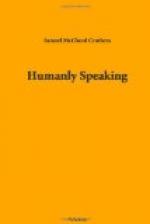A similar caution is necessary in regard to the resemblances between a nation and an individual. When we talk of a national character or temperament, we are using an interesting and bold figure of speech. We speak of millions of people as if they were one. Of course, a nation is not one kind of person; it is composed of many kinds of persons. These persons are diverse in character. All Scotchmen are not canny, nor all Irishmen happy-go-lucky. Those who know a great many Chinamen are acquainted with those who are idealists with little taste for plodding industry. It is only the outsider who is greatly impressed by the family resemblance. To the more analytic mind of the parent each child is, in a most remarkable degree, different from the others.
When we take such typical characters as John Bull and Brother Jonathan as representing actual Englishmen or Americans, we put ourselves in the way of contradiction. They are not good likenesses. An English writer says: “As the English, a particularly quick-witted race, tinged with the colors of romance, have long cherished a false pride in their reputed stolidity, and have accepted with pleasant equanimity the figure of John Bull as their national signboard, though he does not resemble them, so Americans plume themselves on the thought that they are dying of nervous energy.”
There is much truth in this. One may stand at Charing Cross and watch the hurrying crowds and only now and then catch sight of any one who suggests the burly John Bull of tradition. The type is not a common one, at least among city dwellers.
But when we attribute a temperament to a nation, we do not necessarily mean that all the people are alike. We only mean that there are certain ways of thinking and feeling that are common to those who have had the same general experience. The national temperament is manifested not so much in what the people are as in what they admire and instinctively appreciate.
Let us accept the statement that the English are a quick-witted and romantic people who have accepted with pleasant equanimity the reputation for being quite otherwise. Why should they do this? Why should they take pride in their reputed stolidity rather than in their actual cleverness. Here is a temperamental peculiarity that is worth looking into.
John Bull may be a myth, but Englishmen have been the mythmakers. They have for generations delighted in picturing him. He represents a combination of qualities which they admire. Dogged, unimaginative, well-meaning, honest, full of whimsical prejudices, and full of common sense, he is loved and honored by those who are much more brilliant than he.
John Bull is not a composite photograph of the inhabitants of the British Isles. He is not an average man. He is a totem. When an Indian tribe chooses a fox or a bear as a totem, they must not be taken too literally. But the symbol has a real meaning. It indicates that there are some qualities in these animals that they admire. They have proved valuable in the tribal struggle for existence.




